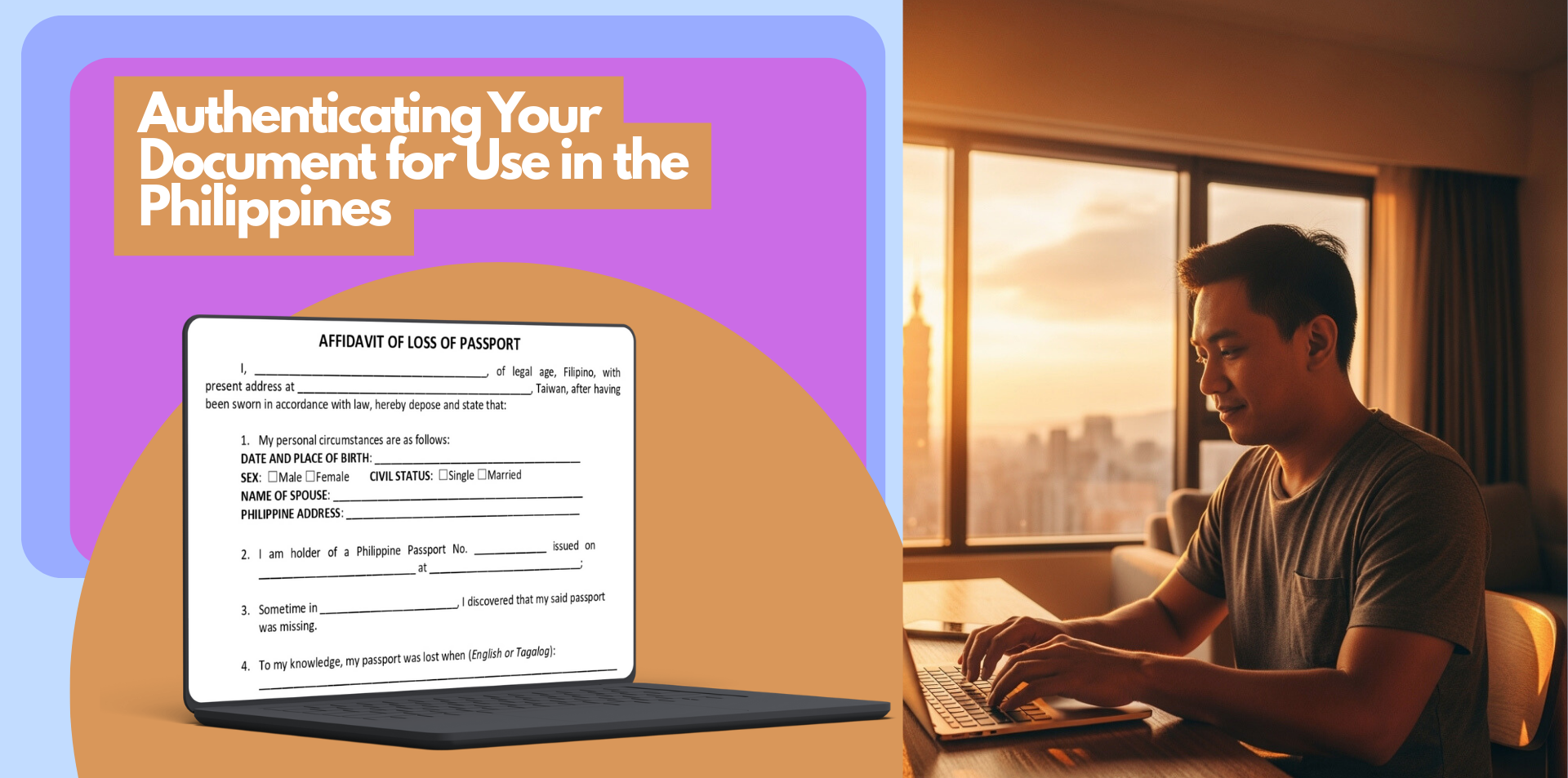Being far from home doesn’t mean you’re far from responsibilities.
For many OFWs in Taiwan, processing documents for legal, personal, or employment purposes back in the Philippines can feel confusing.
But don’t worry — with the right information, you can navigate through every major step of the document authentication process, from notarization at MECO to final approval by TECO without fail.
Let’s break it down.

Why Document Authentication Matters for OFWs
For OFWs, proper document authentication is more than just paperwork—it’s a lifeline that keeps important matters in the Philippines moving smoothly.
Whether it’s granting a family member authority to handle property, processing an NBI clearance for employment, or submitting contracts to Taiwanese agencies, authenticated documents guarantee that your papers are recognized as valid both in Taiwan and the Philippines.
Without this step, simple tasks could turn into stressful delays, affecting not only your job opportunities abroad but also your family’s needs back home.
Start with Notarization at MECO
If you’re executing legal documents in Taiwan (like affidavits or Special Powers of Attorney) for use in the Philippines, your first stop is the Manila Economic and Cultural Office (MECO).
For a list of downloadable documents (Affidavit & SPA) provided by MECO, you may check them out here.
What documents can MECO notarize?
- Affidavits for submission to Philippine offices
- Special Powers of Attorney (SPA)
- Authorization letters
- Copy certification of valid Philippine passports
What you need:
- Original and 3 photocopies of your valid Philippine passport
- Your Alien Resident Certificate (ARC) or Taiwan passport (if dual citizen)
- The document you want notarized
- Appear in person and sign before the MECO notarial officer
Note: MECO may provide templates for common documents and might ask for additional requirements depending on your case.
Authentication by TECO or TECRO
Once notarized, the next step is authentication by the Taipei Economic and Cultural Office (TECO).
Why TECO authentication matters:
- Taiwanese authorities often require authenticated and translated documents.
- TECO ensures your documents are officially recognized in Taiwan.
Requirements:
- The notarized document
- Certified Chinese translations of your document
- A verified translation and appointment booking (some cases)
Note: Processing may take time, and appointments might be necessary— plan ahead.
Philippine Government Authentication (If Needed)
Before submitting your documents to TECO, certain papers (like your birth certificate or NBI clearance) might first need authentication in the Philippines.
This may include:
- Apostille from the DFA
- Verification by the Philippine Embassy
- Agency-specific clearances (e.g., NBI, PSA-certified documents)
Tip: NBI clearance cannot be processed by MECO—but fingerprinting can be done there. You’ll need to prepare a notarized SPA so someone in the Philippines can process the NBI for you.
Documents Required for OFWs Applying for Work in Taiwan
If you’re applying for a job or a visa, you may also need:
- Medical clearance
- Training certificates
- Employment contract (authenticated by MECO)
- Valid IDs and passports
These documents must follow the same process: notarization –> TECO authentication –> certified translation (if needed).
Frequently Asked Questions
Q: What address should I use in my documents?
Use your Taiwan address for documents signed and notarized in Taiwan.
Q: Is my Special Power of Attorney (SPA) valid forever?
Not exactly. It remains valid until the task is completed, but some offices may require a more recent one.
Q: What if I can’t go home to get an NBI clearance?
Do your fingerprinting at MECO and notarize an SPA so a representative in the Philippines can apply for you.
Pro Tips
- Double-check requirements with MECO and TECO before your visit.
- Prepare translations early if your documents will be submitted in Taiwan.
- Be patient—some steps take time, especially when coordinating with multiple agencies.
Why This Matters
Proper document authentication protects your rights and helps you manage your affairs legally, whether it’s signing a contract, buying property, or authorizing someone back home.
Consider an OFW whose Special Power of Attorney wasn’t properly notarized or authenticated. When their family tried to use it in the Philippines, it was rejected — causing delays, extra expenses, and added stress.
Living abroad doesn’t exclude you from important paperwork — it just means taking extra steps to ensure your documents are recognized in both Taiwan and the Philippines. With the right process, each document becomes a vital link to your responsibilities and loved ones back home.
Final Thoughts
Being an OFW in Taiwan already comes with many sacrifices, so don’t let paperwork add to the stress. By understanding the step-by-step process of notarization, authentication, and translation, you can save time, avoid delays, and focus more on your work and family. Every signature, stamp, and seal is more than just a formality—it’s a bridge that connects you to your rights and responsibilities back home. Stay informed, prepare your documents well, and remember that each step brings you closer to peace of mind.
